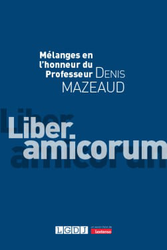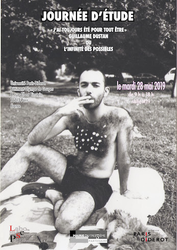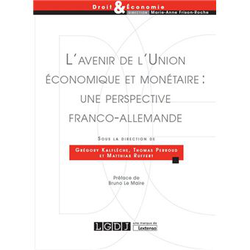Oct. 23, 2025
Publications

🌐follow Marie-Anne Frison-Roche on LinkedIn
🌐subscribe to the Newsletter MAFR Regulation, Compliance, Law
🌐subscribe to the VideoNews MAFR Surplomb
🌐subscribe to the Newsletter MaFR Law & Art
____
► Full Reference: M.-A. Frison-Roche, "Trio", in Mélanges en l'honneur au Professeur Denis Mazeaud, LGDJ-Lextenso, 2025.
____
📝read the article (in French)
____
Since then, due to editorial deadlines, this text has been modified, since this article deals with the so specific French Concours d'Agrégation de Droit, and François Terré, who prepared me for it, joined Pierre Catala before the overall typescript became final.
At Pierre Catala's funeral, where Rémy recounted their last meeting, I was seated at the back next to Yves Lequette, and at François Terré's funeral I was again seated at the back next to Jacques-Henri Robert.
Yves Lequette and Jacques-Henri Robert, with whom I worked long and hard to prepare the Mélanges in honour of François Terré. Yes, it is indeed the Mélanges that, in a great chain, honour the masters. It doesn't matter that this is incomprehensible to those outside the Alma Mater.
When I read Denis's bibliography, which opens his Mélanges, I discover that Denis, who contributed to so many Mélanges, had his first contribution to this sort of books for the Mélanges conceived for François.
____
► English Summary of this contribution : The contribution pays tribute to Denis Mazeaud as a candidate in the Concours d'Agrégation des Facultés de Droit that we took together. As long as the University benefits from professors instituted in this way, i.e. in a non-competitive relationship with their peers and in a non-financially valued relationship with their knowledge and talent, Alma Mater will remain.
____
📗Read the general presentation of these Mélanges.
________

Updated: July 4, 2019 (Initial publication: April 30, 2019)
Publications

► Complete reference : Frison-Roche, M.-A., Having a good behavior in the digital space, working paper, April 2019.
____
Summary: The jurist sees the world through the way he learns to speak
The Law of the Environment has already come to blur this distinction, so finally so strange because this classical conception refers to a person taken firstly in his immobility (Law of individuals), and then in his only actions (Contrats and Tort Law, Property Law). Indeed, the very notion of "environment" implies that the person is not isolated, that he/she is "surrounded", that he/she is what he/she is and will become because of what surrounds him/her ; in return the world is permanently affected by his/her personal action. On second thought, when once "Law of Individuals" was not distinguished from Family Law, the human being was more fully restored by this division in the legal system that not only followed him/her from birth to death but also in him/her most valuable interactions: parents, siblings, couples, children. Thus Family Law was finer and more faithful to what is the life of a human being.
To have instituted Law of Individuals, it is thus to have promoted of the human being a vision certainly more concrete, because it is above all of their identity and their body about what Law speaks, astonishing that we have not noticed before that women are not men like the others. To have instituted the Law of the people, it is thus to have promoted of the human being a vision certainly more concrete, because it is above all of his identity and his body that one speaks to us, astonishing that the we have not noticed before that women are not men like the others
From this concrete vision, we have all the benefits but Law, much more than in the eighteenth century, perceives the human being as an isolated subject, whose corporeality ceases to be veiled by Law
This freedom will come into conflict with the need for order, expressed by society, social contract, state, law, which imposes limits on freedom of one to preserve freedom of the other, as recalled by the French Déclaration des Droits de l'Homme of 1789. Thus, it is not possible de jure to transform every desire in action,, even though the means would be within reach of the person in question, because certain behaviors are prohibited in that they would cause too much disorder and if they are nevertheless committed, they are punished for order to return. Thus, what could be called "law of behavior", obligations to do and not to be put in criminal, civil and administrative Law, national and international Law, substantial Law and procedural Law :they will protect the human being in movment pushed by the principle of freedom forward others and thing, movement inherent in their status as a Person.
The human being is therefore limited in what they want to do. In the first place by the fact: their exhausting forces, their death that will come, the time counted, the money that is lacking, the knowledge that they does not even know not holding, all that is to say by their very humanity; Secondly, by the Law which forbids so many actions ...: not to kill, not to steal, not to take the spouse of others, not to pass as true what is false, etc. For the human being on the move, full of life and projects, Law has always had a "rabat-joy" side. It is for that reason often ridiculous and criticized because of all its restraining regulations, even hated or feared in that it would prevent to live according to our desire, which is always my "good pleasure", good since it is mine. Isolated and all-powerful, the human being alone not wanting to consider other than its desire alone.
Psychoanalysis, however, has shown that Law, in that it sets limits, assigns to the human being a place and a way of being held with respect to things and other persons. If one no longer stands themselves by the prohibition of the satisfaction of all desire (the first of which is the death of the other), social life is no longer possible
But this presentation aims to make it possible to admit that the criterion of Law would be in the effectiveness of a sanction by the public power: the fine, the prison, the confiscation of a good, which the rudeness does not trigger whereas Law would imply it: by this way we are thus persuaded of the intimacy between the public power (the State) and Law... But later, after this first lesson learned, the doubt comes from the consubstansuality between Law and State. Is it not rather appropriate to consider that Law is what must lead everyone to "behave well" with regard to things and people around them? The question of punishment is important, but it is second, it is not the very definition of Law. The French author Carbonnier pointed out that the gendarme's "kepi" is the "Law sign", that is to say what it is recognized without hesitation, but it is not its definition.
The first issue dealt with by Law is then not so much the freedom of the person as the presence of others. How to use one's freedom and the associated deployment of forces in the presence of others? How could I not using it when I would like to harm them, or if the nuisance created for them by the use of my free strength is indifferent to me
We do not use our force against others because we have interest or desire, we do not give him the support of our strength while he indifferent us, because Law holds us. If the superego was not enough. If Law and the "parental function of the States" did not make alliance. We do it because we hold ourselves
Or rather we were holding ourselves.
Because today a new world has appeared: the digital world that allows everyone not to "hold" himself, that is to say to constantly abuse others, never to take them into consideration, to attack massively. It's a new experience. It is not a pathological phenomenon, as is delinquency (which simply leads to punishment), nor a structural failure in a principle otherwise admitted (which leads to regulatory remedies) but rather a new use, which would be a new rule: in the digital space, one can do anything to everyone, one is not held by anything or anyone, one can "let go" (I). This lack of "good behavior" is incompatible with the idea of Law, in that Law is made for human beings and protect those who can not afford to protect themselves; that is why this general situation must be remedied (II).
Cornu, G., Linguistique juridique, 2005.
Frison-Roche, M.-A. & Sève, R., Le Droit au féminin (ed.), 2003.
Under this "mask" of the "subject of Law", we are all equal. S. Archives de Philosophie du Droit, Le sujet de droit, 1989.
Baud, J.P., L'affaire de la main volée. Histoire juridique du corps humain, 1993.
On neurosis as a constitutive mode of child sociability, s. Lebovici, S., "C'est pas juste", in La justice. L'obligation impossible, 1994.
Read the article of Alain Supiot about the idée of Rule common of all, under the discussion between all, presented by this author through the artwork of Kafka : "Kafka, artiste de la loi", 2019; Kafka is very present in the work of Alain Supiot, for example in his First Lesson in the Collège de France, 2012, or in an Introduction of La Gouvernance par les nombres ; This latter book is now available in English : Governance by numbers. The making a legal model of allegiance, 2017 (translated by S. Brown).
That's why splitting Persons Law and Family Law masks another reality: the family is not made up of third parties. The links are there. They pre-exist. Starting from the only Persons Law pushes to think one can "build" his/her family by links drawn on white paper: the contracting of the families made up of individuals becomes thinkable, even natural.
May 28, 2019
Conferences

Référence complète : Frison-Roche, M.-A., Participation à la journée d'étude: « J’ai toujours été pour tout être » : Guillaume Dustan ou l’infinité des possibles in Laboratoire du Changement Social et Politique, Paris-Diderot, Paris, 28 mai 2019.
Consulter le document de travail servant de base à la participation à la journée d'étude.
Consulter la présentation générale du programme.
Consulter la présentation du colloque.
Jan. 8, 2019
Blog

La collection Droit & Economie sort son 33ième volume.
Il est consacré à l'Europe, c'est-à-dire à l'amitié franco-allemande, puisqu'aujourd'hui c'est sur cette amitié-là que l'on peut croire encore à l'Europe.
Si l'on a une vision politique des espaces, alors c'est la notion d'amitié qui doit ressortir.
C'est autour d'elle que Bruno Le Maire a construit sa préface : lire la préface que le ministre de l'économie et des finances a fait à l'ouvrage.

Updated: Oct. 25, 2017 (Initial publication: May 27, 2016)
Publications

► Full Reference: Frison-Roche, M.-A., Globalization from the point of view of Law, working paper, May 2017.
____
🎤 This working paper initially served as a basis for a synthesis report made in French in the colloquium organized by the Association Henri Capitant in the International German Days on the subject of "Le Droit et la Mondialisation" (Law and Globalization).
📝 Il sert dans un second temps de base à l'article paru dans l'ouvrage La Mondialisation.
📝 it serves as a second basis for the article (written in English, with a Spanish Summary) to be published in the Brezilian journal Rarb - Revista de Arbitragem e Mediação (Revue d`Arbitrage et Médiation).
It uses the Bilingual Dictionary of the Law of Regulation and Compliance.
____
► Summary of the Working: Globalization is a confusing phenomenon for the jurist. The first thing to do is to take its measure. Once it has been taken, it is essential that we allow ourselves to think of something about it, even if we have to think about it. For example, on whether the phenomenon is new or not, which allows a second assessment of what is taking place. If, in so far as the law can and must "pretend" to defend every being, a universal claim destined to face the global field of forces, the following question - but secondary - is formulated: quid facere? Nothing ? Next to nothing ? Or regulate? Or can we still claim that the Law fulfills its primary duty, which is to protect the weak, including the forces of globalization?
____
read the Working Paper below⤵️
Jan. 5, 2017
Blog

Le juge a le pouvoir de "qualifier", c'est-à-dire de donner à une situation de fait ou de droit sa nature, quelle que soit les termes qu'ont utilisé les personnes. Cet office du juge est exprimé par l'article 12 du Code de procédure.
Ainsi, les réseaux sociaux utilisent le terme "amis".
Ce terme a des conséquences juridiques très importantes. En effet, en droit les relations amicales supposent par exemple un désintéressement, l'ami travaillant gratuitement au bénéfice de l'autre. Mais déjà la Cour d'appel de Paris à laquelle FaceBook avait raconté cette fable, se présentant comme le constructeur désintéressé uniquement soucieux de permettre aux internautes de nouer des liens d'amitié, avait répondu en février 2016 que le souci premier de cette entreprise florissante était bien plutôt le profit. Comme on le sait, le profit et la gratuité font très bon ménage.
De la même façon, une relation amicale suppose un souci que l'on a de l'autre, une absence de distance, une certaine chaleur. En cela, une relation amicale est toujours partiale.
C'est pourquoi logiquement lorsqu'un avocat fût l'objet d'une procédure disciplinaire devant le conseil de l'ordre, il demanda la récusation de certains de ces confrères siégeant dans la formation de jugement en évoquant le fait qu'ils étaient "amis" sur FaceBook, ce qui entacherait leur impartialité, les instances disciplinaires étant gouvernées par le principe subjectif et objectif d'impartialité.
Par un arrêt du 5 janvier 2017, la deuxième chambre civile de la Cour de cassation, comme la Cour d'appel, refuse de suivre un tel raisonnement.
En effet, celui-ci n'aurait de sens que si en soi les personnes en contact sur un réseau social étaient effectivement des "amis". Mais ils ne le sont pas. Comme le reprend la Cour de cassation dans la motivation de la Cour d'appel, "le terme d’ « ami » employé pour désigner les personnes qui acceptent d’entrer en contact par les réseaux sociaux ne renvoie pas à des relations d’amitié au sens traditionnel du terme et que l’existence de contacts entre ces différentes personnes par l’intermédiaire de ces réseaux ne suffit pas à caractériser une partialité particulière, le réseau social étant simplement un moyen de communication spécifique entre des personnes qui partagent les mêmes centres d’intérêt, et en l’espèce la même profession".
Ce sont des personnes qui ont des choses en commun, ici une profession, mais cela peut être autre chose, éventuellement un sujet de dispute, même si les études récentes montrent que les personnes se rejoignent plutôt sur des opinions communes.
Mais il ne s'agit tout d'abord que d'un renvoie à une "appréciation souveraine" des faits. Ainsi, si la personne avait apporté la preuve d'une opinion partagée sur le réseau montrant un préjugé - même abstraitement formulé - lui étant défavorable, le résultat aurait été différent. De la même façon, comme cela est souvent le cas, des liens personnels se nouent, par des photos plus personnelles, des échanges plus privés, etc., alors le résultat aurait été différents.
Ainsi, les contacts sur un réseau sociaux ne sont pas en soi des "amis", mais ils peuvent l'être ou le devenir. L'enjeu est donc probatoire. Montrer un lien virtuel n'est pas suffisant, mais c'est une première étape, qui peut mener à la démonstration, qui continue de reposer sur le demandeur à l'instance, d'un lien personnel et désintéressé, ce qui renvoie à la définition juridique de l'amitié, excluant notamment l'impartialité.